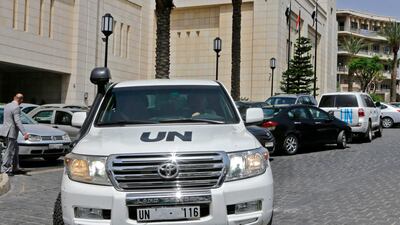Chemical weapons experts want to exhume the bodies of the victims of a chemical attack last month on the city of Douma, a former rebel-held enclave on the outskirts of Damascus.
The unprecedented move will see inspectors from the Organisation for the Prohibition of Chemical Weapons (OPCW) gather samples in a bid to amass indisputable proof of whether chlorine or sarine were used in the attack.
The inspectors have already gathered over 100 "environmental samples," the head of the OPCW told the Financial Times on Thursday.
However, say experts, two weeks of Syrian and Russian alleged obstructions may have resulted in vital chemical evidence "slipping away."
In an interview with The National last month, Jerry Smith, who helped oversee the OPCW-led withdrawal of much of Syria's sarin stockpile in 2013 said that every hour, day or week of delay may have diluted what the inspectors will eventually uncover in Douma.
__________
Read more:
Editorial: Scrubbing evidence of chemical weapons' use is as bad as using them
Douma evidence may have 'slipped away' because of Syrian and Russian delays
Belgian companies to be prosecuted for exporting chemicals to Syria
_________
OPCW experts have in past carried out autopsies, explained Mr Uzumcu. But the exhumation of bodies is an unprecedented move for the watchdog.
The organisation has been critcised for not doing enough to prevent President Bashar Al Assad's use of chemical weapons.
For weeks Douma and the larger Eastern Ghouta area came under heavy bombardment from regime and Russian strikes. According to Airwars, a UK-based non-profit organisation that tracks reports of civilians deaths in Iraq and Syria, there were 250 civilians casualties in March alone attributed to Russia and centred around the area of Eastern Ghouta.
North of Douma, in the countryside north of Homs, rebels agreed on Wednesday to a Russia-brokered withdrawal deal. The deal would restore state rule, with fighters handing over their heavy weapons. The agreement also states that the Russian police and Syrian civil police would enter after the evacuation of the last bus.
Each fighter may take one rifle and three reserve bullets as well as their personal belongings and lorries can be used to transfer possible furniture. No money or jewels to be taken by evacuees and the authorities have the right to decide the route of the evacuation journey and should expect inspections by the Russian military police .
The deal is valid for six months and civilians who stay behind will be subject to be drafted into the Syrian military.
What the Russians want, said Col. Fatih Hassoun of the Free Syrian Army, is surrender and forced displacement.
"They preceded it with heavy shelling and the preparation of agents to help them disperse the resistance of the region," he told The National.
Meanwhile on Thursday in the western Syrian province of Latakia, a Russian fighter jet stationed in Syria crashed, killing its pilots, Moscow's Defence Ministry confirmed.
State news agency Tass cited the ministry as saying the Su-30 jet crashed after climbing from takeoff at the Russian Hemeimeem airbase in the western Syrian province of Latakia.
"As it was climbing after taking off from the Hmeimim airbase, the Russian fighter Su-30SM crashed into the Mediterranean Sea. Two pilots, who fought until the last minute to save the plane, died, according to reports from the scene", his statement said.
Russia said the aircraft had not come under enemy fire, but that a bird could have fallen "into the engine", according to preliminary information.
The plane was among Russia's most advanced and performed its maiden flight in 2012. In Syria, it was used to launch air-to-ground missiles at rebel targets and to escort attack jets and strategic bombers.
The country that is supporting the regime of Syrian President Bashar Al Assad has suffered 86 military deaths since it intervened in Syria in October 2015.
With additional reporting by Jacob Wirtschafter

